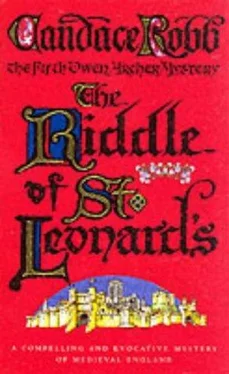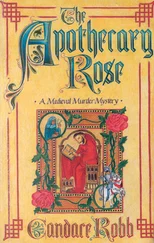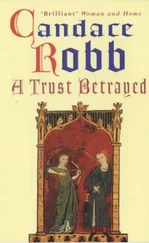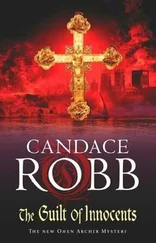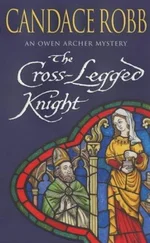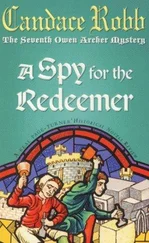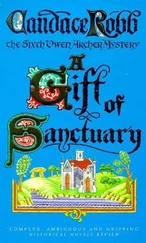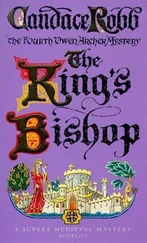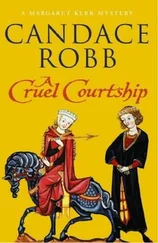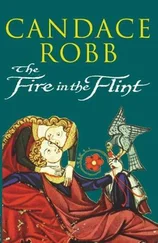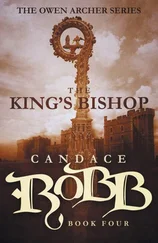Candace Robb - The Riddle Of St Leonard's
Здесь есть возможность читать онлайн «Candace Robb - The Riddle Of St Leonard's» весь текст электронной книги совершенно бесплатно (целиком полную версию без сокращений). В некоторых случаях можно слушать аудио, скачать через торрент в формате fb2 и присутствует краткое содержание. Год выпуска: 2011, ISBN: 2011, Издательство: Random House, Жанр: Исторический детектив, на английском языке. Описание произведения, (предисловие) а так же отзывы посетителей доступны на портале библиотеки ЛибКат.
- Название:The Riddle Of St Leonard's
- Автор:
- Издательство:Random House
- Жанр:
- Год:2011
- ISBN:9781446439838
- Рейтинг книги:4 / 5. Голосов: 1
-
Избранное:Добавить в избранное
- Отзывы:
-
Ваша оценка:
- 80
- 1
- 2
- 3
- 4
- 5
The Riddle Of St Leonard's: краткое содержание, описание и аннотация
Предлагаем к чтению аннотацию, описание, краткое содержание или предисловие (зависит от того, что написал сам автор книги «The Riddle Of St Leonard's»). Если вы не нашли необходимую информацию о книге — напишите в комментариях, мы постараемся отыскать её.
The Riddle Of St Leonard's — читать онлайн бесплатно полную книгу (весь текст) целиком
Ниже представлен текст книги, разбитый по страницам. Система сохранения места последней прочитанной страницы, позволяет с удобством читать онлайн бесплатно книгу «The Riddle Of St Leonard's», без необходимости каждый раз заново искать на чём Вы остановились. Поставьте закладку, и сможете в любой момент перейти на страницу, на которой закончили чтение.
Интервал:
Закладка:
‘You do not look at me. You are angry?’
Lucie glanced up, surprised by the question. Jasper also watched her, though less obviously than Owen whose hawk-eye was fixed on her. ‘Sweet Jesu , how could you think me angry, my love?’ She rose, held out her hand to him. ‘Come. Let us walk in the garden.’
The shrubs and trees rustled softly in the evening breeze. As they strolled past the rosemary hedge, Owen said, ‘The archbishop had a fire of rosemary wood in his parlour on such a day.’
Lucie pressed Owen’s hand. ‘As you said this morning, we are all a bit childish at present. These are fearful times.’
‘Not so bad as the previous two.’
‘A death is a death, Owen.’
‘Aye. But he is more than childish, Lucie. To destroy a house for the stones.’
‘It is not such an odd idea to me, my love. And for what better purpose?’
‘I am wrong?’
Lucie stopped, turned to him, took both his hands. ‘Perhaps to criticise his scheme so fiercely, my love. But not to insist on my need of you.’
‘And what of involving myself in the troubles at St Leonard’s?’
‘Who better than you, my love?’
Owen was silent.
‘Well? Who better?’
‘Why do you think he is willing to stop at Freythorpe?’
Always suspicious. Lucie lifted Owen’s hands, turned them palms upwards, kissed them in turn, looked him in the eye. ‘Do not question it, just be thankful he will do it. He is proud of Hugh and Gwenllian. If aught is amiss, we shall hear quickly.’ She could tell from his eye that he did not share her confidence. She was suddenly fearful.
Alisoun arrived at the farm long after sunset. She was relieved to find the nag in the enclosed field, sleeping under the stars. Alisoun gave her a spoonful of her aunt’s facial concoction, having brought a goodly portion with her, and she promised to give the horse a brushing in the morning and to apply more salve to her wound. The nag whinnied softly as Alisoun slipped away: a pleasant, companionable sound in her solitude. Not like the crickets whose night song made the farm seem lonelier. The crickets’ chorus was a sound the girl associated with heading out in the dark to relieve herself, or lying awake in the cottage unable to sleep.
As she entered the yard, Alisoun paused. She sensed company, not by sound or sight, but by a prickling at the back of her neck that her father had taught her to respect. Someone had come to rob them. Or take over the farm. It was just what Alisoun had feared. And her uncle was to blame with his silly idea of bringing her to his house. She stood as still as possible, studying the barn and house, seeking a glimmer of light that would tell her where she might find the intruder. But all was dark. Was she imagining it? Who but she could find their way round these buildings at night?
Unless the dead walked. Alisoun crossed herself. Not that her family had any cause to harm her from the other side of the grave, but to see them once they had passed to the other side … They would be different. She did not like to think of that. It frightened her that they would have been changed by death. Would she know them? Would they know her?
Alisoun felt her stomach going queer. She forced her mind from such thoughts, peered into the darkness. And then she saw it. A flickering light up in the barn’s loft.
Whence came the light? Her stomach leapt and tumbled. The spirits of the dead might be wrapped in light. And angels: might they not glow? Like the stars?
Alisoun shook her head and considered the light. Surely angels, pure beings, would glow with white light. And they would not flicker because they would be perfect. This was a candle or a lantern, no spectre.
An intruder then. She found that comforting. She could deal with an intruder. Taking a deep breath to steady herself and quiet her stomach, Alisoun strung her bow, readied an arrow, and crept across the yard to the barn. The warped door to the barn was slightly open, so she might slip in without a sound. But would the intruder see her? She paused, considered. She could not call on her memory to predict how the light the intruder carried up there would fall on the floor below. Her father had never taken a light up to the loft because it was much too easy to spark a fire in the barn.
Alisoun crept close to the opening, peered inside, withdrew her head quickly, her heart pounding. God must be watching over her. Had she crept in without first looking, the intruder would have seen her. He sat at the top of the ladder, his feet resting on the top rung, a lantern dangling from one hand. And he was watching the door. Had he heard her? But she had been as quiet as could be. Adults did not hear that well, unless they had trained themselves to hear. Hunters and soldiers had trained hearing. Alisoun knew he was neither. Or she was fairly certain he wasn’t. But now that she thought of it, she was not sure what he was. Or who. All she knew was that her mother had tried to keep this man’s visits secret.
It had been almost a fortnight since Alisoun had hailed the fisherman on the river. More than a week since the Riverwoman and the archer had been there. Folk never kept quiet. One of them or all three of them might have spoken of the deaths. Alisoun felt undeniably sick to her stomach now. It must be that he had heard about her family. He might not know she had survived. Or if he did, he would expect her to be with her kin.
Alisoun imagined him in the house, in the barn, walking round her land. She did not like it. She had never liked him. She did not like that he’d been through the house and barn, that he had touched her things. She hated him.
She would shoot him. But she couldn’t while he held that lantern in his hands for he might drop it in the hay and set the barn on fire. So she prepared herself for a long wait.
Waiting was the worst part. The crickets seemed louder, the night sky darker and closer. She must not think about her prey else she might grow angrier and that would make her more likely to miss. She forced herself to think about the two who had come to bury her family. The old hag she had seen before, when her mother had given birth to her brother and sister. What Alisoun remembered about those events was how her mother had suffered. Especially after her brother’s birth. Her mother had said that the Riverwoman was a trustworthy midwife. But her mother had been so weak with her brother’s birth, and he had been such a troublesome, weak baby. Alisoun had decided that the Riverwoman had poisoned her mother, or put a curse on her. Yet when Alisoun had searched the loft after the Riverwoman and the one-eyed soldier had returned the horse and cart, certain that they had gone up there while she was hiding in the wood, she had found naught out of place. So the old woman and the archer were honest.
A rustle from within. Alisoun checked her bow, slipped into the barn. Her patience was rewarded. The intruder had set the lantern down on a ledge near the nag’s stall and was searching the nag’s hay, his back turned. Nicely illuminated, he presented an easier target than Alisoun’s usual coneys. She shot, hit the back of his leg just below the knee. As he cursed and stumbled, she drew another arrow, waited until he faced her, then shot him in the upper arm. Or had she hit his shoulder? She did not stop to make sure. She ran.
The moon shone on the quiet village. A barking dog rushed towards Alisoun. For a moment, her heart pounded. But she reminded herself that he knew her, had licked her hand a few days earlier when she had passed through with her uncle. As he reached her, he paused, ceased his barking, sniffed the air. Then he cautiously circled round her, sniffing. And again. And again. His circles grew smaller and smaller, but it took five for him to remember her. Then at last he stood in her path and barked once, his tail wagging, demanding her attention. Alisoun dropped to a crouch and patted him, hoping to quiet him.
Читать дальшеИнтервал:
Закладка:
Похожие книги на «The Riddle Of St Leonard's»
Представляем Вашему вниманию похожие книги на «The Riddle Of St Leonard's» списком для выбора. Мы отобрали схожую по названию и смыслу литературу в надежде предоставить читателям больше вариантов отыскать новые, интересные, ещё непрочитанные произведения.
Обсуждение, отзывы о книге «The Riddle Of St Leonard's» и просто собственные мнения читателей. Оставьте ваши комментарии, напишите, что Вы думаете о произведении, его смысле или главных героях. Укажите что конкретно понравилось, а что нет, и почему Вы так считаете.
